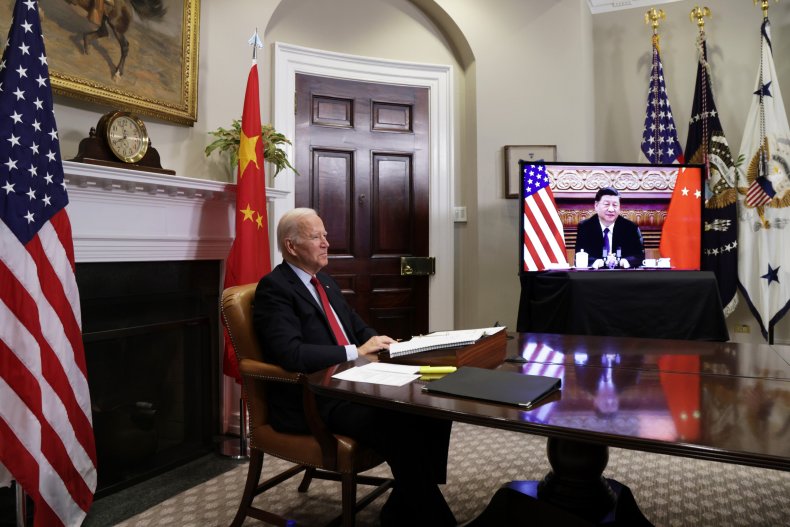Joe Biden and Xi Jinping Cool Flaring U.S.-China Tensions in First Summit
President Joe Biden and his Chinese counterpart Xi Jinping concluded late on Monday their first summit of the year by agreeing to maintain open dialogue in order to rein in flaring tensions.
The three-hour talks via video link began with the two leaders issuing respective opening remarks as Biden said Washington and Beijing needed to "ensure that the competition between our countries does not veer into conflict, whether intended or unintended." The president called for the establishment of "common-sense guardrails" to maintain what he termed "straightforward competition."
Xi said the two countries needed to "increase communication and cooperation," adding: "Humanity lives in a global village, and we face multiple challenges together."
Sound bilateral relations are required for maintaining peace and stability in the "international environment, including finding effective responses to global challenges such as climate change and the COVID-19 pandemic," Xi told Biden before the closed-door summit began.
Biden was flanked by Secretary of State Antony Blinken, national security adviser Jake Sullivan, Treasure Secretary Janet Yellen and White House Indo-Pacific coordinator Kurt Campbell, among others.
Participants in Beijing included China's Foreign Minister Wang Yi, the Chinese Communist Party's chief foreign affairs official Yang Jiechi, Chinese Vice Premier and trade negotiator Liu He as well as senior CCP official and close Xi aide Ding Xuexiang.

Readouts released by the White House and the Chinese Foreign Ministry showed both presidents used the talks—the third time they have spoken after lengthy phone calls in February and September—to reaffirm their respective positions on a number of issue areas, and in the case of Beijing, emphasize its "red lines." Biden repeated his call for responsible competition, while Xi asked for respect and coexistence.
"As in previous discussions, the two leaders covered areas where our interests align, and areas where our interests, values and perspectives diverge," the White House readout said. Biden raised concerns about Chinese policies in Xinjiang, Tibet and Hong Kong, "as well as human rights more broadly." The leaders also repeated prepared remarks on Taiwan, a continuing area of disagreement as the democratic island gains international sympathy in its struggle for political parity and dignity.
China's Xi presented "three principles" and "four priorities," which he felt could guide U.S.-China relations going forward.
"China and the U.S. should respect each other, coexist in peace and pursue win-win cooperation," Xi said in familiar language, according to the Foreign Ministry's statement. The Chinese president said the two powers "need to treat each other as equals, keep differences under control and seek common ground while reserving differences."
"No conflict and no confrontation is a line that both sides must hold," the Chinese readout said. "With their interests deeply intertwined, China and the U.S. stand to gain from cooperation and lose from confrontation."
The first U.S.-China leaders' summit of the Biden administration saw no dramatic breakthroughs but concluded with the important consensus of maintaining communication at all levels in order to keep tensions at a minimum.
The two nations continue to diverge on issues including human rights and the rule of law; the leaders also did not appear to discuss the upcoming Beijing 2022 Winter Olympics and the highly anticipated American response to the Games. Fundamental differences still remain with regard to Taiwan, but more dialogue reduces the chance of misunderstanding and, along with it, the risk of cross-strait tensions reaching a boiling point.
The Biden administration has actively sought high-level talks with China since the beginning of the year, even though the meetings often become an exercise in repeating well-known areas of contention. Xi, however, echoed Biden's call to "keep lines of communication open."
"The two sides could fully harness the dialogue channels and mechanisms between their diplomatic and security, economic and financial, and climate change teams," the Chinese president added, noting similarly that the two parties need to "manag[e] differences and sensitive issues in a constructive way to prevent China-U.S. relations from getting derailed or out of control."
According to the Chinese Foreign Ministry readout, Biden told Xi the U.S. "does not seek to change China's system," while "the revitalization of its alliances is not anti-China, and the U.S. has no intention to have a conflict with China."
"The two presidents agreed that their meeting is candid, constructive, substantive and productive," the statement continued. "It helps increase mutual understanding, adds to the positive expectation of the international community for this relationship, and sends a powerful message to the two countries and the world."

